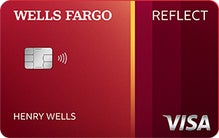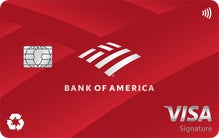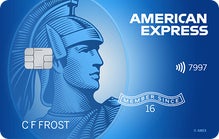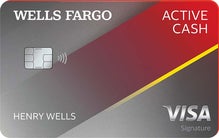Best low-interest credit cards for February 2026
Advertiser Disclosure: Bankrate’s editorial team chooses and recommends the credit cards on this page. Our websites may earn compensation when a customer clicks on a link, when an application is approved, or when an account is opened. However, our recommendations and card ratings are produced independently without influence by advertising partnerships with issuers.
Filter by
Showing 11 results
Best for long intro APR offers
on Wells Fargo's secure site
See Rates & FeesPurchase intro APR
0% intro APR for 21 months from account opening on purchases
Regular APR
17.49%, 23.99%, or 28.24% Variable APR
Intro offer
N/A
Rewards rate
N/A
What you should know
Card Details
Best for customizable rewards
Balance transfer intro APR
0% Intro APR for 15 billing cycles for any BTs made in the first 60 days. A fee of 3% for 60 days from account opening, then 4% will apply.
Regular APR
17.49% - 27.49% Variable APR on purchases and balance transfers
Rewards rate
1% - 6%
Annual fee
$0
Why you'll like this: With its easy-to-earn bonus, solid intro APR offers and customizable rewards, it offers short- and long-term flexibility and value.
Reward Details
What you should know
Card Details
Best for rotating-category cash back
on Discover's secure site
See Rates & FeesPurchase intro APR
0% intro APR for 15 months
Regular APR
17.49% - 26.49% Variable APR
Intro offer
Cashback Match
Rewards rate
1% - 5%
Why you'll like this: It offers solid short- and long-term value with its combo of an intro APR, first-year Cashback Match and rotating categories.
Reward Details
What you should know
Card Details
Best for Bank of America customers
Purchase intro APR
0% Intro APR for 15 billing cycles for purchases
Regular APR
17.49% - 27.49% Variable APR on purchases and balance transfers
Intro offer
$200
Rewards rate
1.5% - 2%
Why you'll like this: You can earn up to a 2.62 percent flat cash back rate based on your savings — one of the highest rates on the market.
Reward Details
What you should know
Card Details
Apply with confidence
By applying, you can see if you're approved before impacting your credit
Best for families
on American Express's secure site
See Rates & Fees, Terms ApplyPurchase intro APR
0% on purchases for 15 months
APR
19.49%-28.49% Variable
Intro offer
Earn $200
Rewards rate
1% - 3%
Why you'll like this: It offers a great balance of rewards value and intro APR offers.
Reward Details
What you should know
Card Details
Best for dining and grocery rewards
on Capital One's secure site
See Rates & FeesPurchase intro APR
0% intro on purchases for 12 months
Regular APR
18.49% - 28.49% (Variable)
Intro offer
Earn a one-time $200 cash bonus
Rewards rate
1% - 8%
Why you'll like this: It holds great long-term value as one of the only cards that earns rewards at such a high rate at both grocery stores and restaurants.
Reward Details
What you should know
Card Details
Best for large purchases
on Wells Fargo's secure site
See Rates & FeesPurchase intro APR
0% intro APR for 12 months from account opening on purchases
Regular APR
18.49%, 24.49%, or 28.49% Variable APR
Intro offer
$200 cash rewards
Rewards rate
2%
Why you'll like this: This card has great long-term value through its ability to earn constant rewards, the intro balance transfer offer and great cellphone protection.
Reward Details
What you should know
Card Details
Best for 1.5% cash back
on Capital One's secure site
See Rates & FeesPurchase intro APR
0% intro on purchases for 15 months
Regular APR
18.49% - 28.49% (Variable)
Intro offer
Earn a one-time $200 cash bonus
Rewards rate
1.5% - 5%
Why you'll like this: Its flat rewards rate and low cost make it a great foundation for a Capital One rewards stack.
Reward Details
What you should know
Card Details
Best for balance transfers
Purchase intro APR
0% for 12 months on Purchases
Regular APR
16.49% - 27.24% (Variable)
Intro offer
N/A
Rewards rate
N/A
Why you'll like this: It has one of the longest intro APRs for balance transfers, making it a great pick for debt-reducers.
What you should know
Card Details
on Chase's secure site
See Rates & FeesPurchase intro APR
0% Intro APR on Purchases for 15 months
Regular APR
18.24% - 27.74% Variable
Intro offer
Earn $200 cash back
Rewards rate
1.5% - 5%
Why you'll like this: Its mix of bonus categories makes it easy to earn travel rewards even if you don’t spend heavily on travel.
Reward Details
What you should know
Card Details
Best credit union card
Intro offer
N/A
Rewards Rate
N/A
Annual fee
$0
Regular APR
17.99% Variable APR
Why you'll like this: Its relatively low ongoing APR and simplicity make it easy to focus on paying off your balance.
What you should know
Remove a card to add another to compare
Remove a card to add another to compare
Compare Bankrate’s top low-interest credit cards
| Card Name | Variable APR | Best for | Bankrate review score |
|---|---|---|---|
|
Regular APR: 17.49%, 23.99%, or 28.24% Variable APR
|
Long intro APR offers |
4.3 / 5 Our writers, editors and industry experts score credit cards based on a variety of factors including card features, bonus offers and independent research. Credit card issuers have no say or influence on how we rate cards.
Apply now
on Wells Fargo's secure site
|
|
|
Regular APR: 17.49% - 26.49% Variable APR
|
Rotating-category cash back |
4.1 / 5 Our writers, editors and industry experts score credit cards based on a variety of factors including card features, bonus offers and independent research. Credit card issuers have no say or influence on how we rate cards.
Apply now
on Discover's secure site
|
|
|
Regular APR: 17.49% - 27.49% Variable APR on purchases and balance transfers
|
Bank of America Customers |
3.6 / 5 Our writers, editors and industry experts score credit cards based on a variety of factors including card features, bonus offers and independent research. Credit card issuers have no say or influence on how we rate cards.
Apply now
on Bank of America's secure site
|
|
|
Regular APR: 19.49%-28.49% Variable
|
Families |
4.6 / 5 Our writers, editors and industry experts score credit cards based on a variety of factors including card features, bonus offers and independent research. Credit card issuers have no say or influence on how we rate cards.
Apply now
on American Express's secure site
See Rates & Fees
, Terms Apply
|
|
|
Regular APR: 18.49% - 28.49% (Variable)
|
Dining and grocery rewards |
5.0 / 5 Our writers, editors and industry experts score credit cards based on a variety of factors including card features, bonus offers and independent research. Credit card issuers have no say or influence on how we rate cards.
Apply now
on Capital One's secure site
|
|
|
Regular APR: 18.49%, 24.49%, or 28.49% Variable APR
|
Large purchases |
4.3 / 5 Our writers, editors and industry experts score credit cards based on a variety of factors including card features, bonus offers and independent research. Credit card issuers have no say or influence on how we rate cards.
Apply now
on Wells Fargo's secure site
|
|
|
Regular APR: 18.49% - 28.49% (Variable)
|
1.5% cash back |
3.8 / 5 Our writers, editors and industry experts score credit cards based on a variety of factors including card features, bonus offers and independent research. Credit card issuers have no say or influence on how we rate cards.
Apply now
on Capital One's secure site
|
|
|
Regular APR: 16.49% - 27.24% (Variable)
|
Balance transfers |
4.1 / 5 Our writers, editors and industry experts score credit cards based on a variety of factors including card features, bonus offers and independent research. Credit card issuers have no say or influence on how we rate cards.
Apply now
on Citi's secure site
|
|
|
Regular APR: 18.24% - 27.74% Variable
|
Domestic travel |
5.0 / 5 Our writers, editors and industry experts score credit cards based on a variety of factors including card features, bonus offers and independent research. Credit card issuers have no say or influence on how we rate cards.
Apply now
on Chase's secure site
|
|
|
Regular APR: 17.99% Variable APR
|
Credit union customers |
|
What is a low-interest credit card?
A low-interest credit card is defined by its annual percentage rate (APR), which can be variable or fixed. If the low end of the variable percentage is around 19 percent, we generally qualify it as a low-interest card.
Several of the cards on this page will be a great place to start when trying to decide on your next credit card, but it’s worth comparing them to narrow down your options to the ones that are best for you. To do this, you’ll need to know your goals, your current financial situation, the features available on low-interest cards and how much you plan to spend over the next year or so. The more you know, the better chance you have of reducing current debt or keeping any new debt low.
When is a low-interest credit card helpful?
A low-interest card is helpful for keeping interest charges at a more manageable level. Although credit card interest rates are all quite high, a card with a lower-than-average interest rate is your best chance at saving money if you currently have credit card debt or are making purchases while carrying a balance. Here are some situations that a low-interest credit card can help ease the burden of interest charges:
- You carry credit card debt over several billing cycles.
- You have new purchases coming up and you can’t pay them off right away.
- Your current credit card interest rate is more than 20 percent.
Our 2024 Credit Card Debt Report claims that more than half of American adults have credit card balances, and 60 percent have carried a balance for more than a year. If you find yourself strapped with debt like most Americans, it’s worth considering how a low-interest credit card can help you manage your debt.
You might also consider a credit card with an introductory zero interest period. These cards can be helpful for managing debt too, but these offers are temporary. Low-interest credit cards are better products for long-term debt management.
Features of the best low-interest cards
A low interest card lets you carry a balance with minimal charges. These cards don’t usually have high rewards rates and flashy perks, but they’re great for long-term stability with minimal interest. Here's what to look for:
Great low-interest cards have intro APR offers on purchases and balance transfers, and pair them with a low ongoing APR.
Best cards: Citi® Diamond Preferred® Card and the Wells Fargo Reflect® Card
The best low-interest cards will also let you access perks, benefits and rewards at no additional cost.
Best card: Chase Freedom Unlimited®
Your goal with a low-interest card is to pay less interest than you would without it, so any card below the current average credit card interest rate of 20 percent will be ideal.
Comparing credit card interest charges
You might be surprised by how much low-interest credit cards can save you compared to cards with higher APRs. Our minimum payment calculator can help you figure out the specifics of your unique financial situation.
If you’re not sure where to start comparing a low-interest card and another card using your current balance(s), here is how one of our low-interest cards compares to a rewards card and a credit union card using average credit card debt from Experian's most recent report. Cards from credit unions can be very cost-effective and typically have rates well below the current average. Navy Federal Credit Union is one option, but there might be several, smaller local credit unions in your area with comparable credit card interest rates.
| Credit card | Credit card ongoing APR* | Daily periodic rate | Balance | Interest for a 30-day billing cycle |
| Navy Federal Platinum Credit Card* | 10.24% - 18.00% (Variable) | 0.030% | $6,730 | $61.05 |
| Chase Sapphire Preferred® Card | 19.24% - 27.49% Variable | 0.058% | $6,730 | $111.46 |
| Wells Fargo Reflect® Card | 17.49%, 23.99%, or 28.24% Variable APR | 0.049% | $6,730 | $96.02 |
*Using each card’s lowest possible Variable APR.
Bankrate Insight
If you're dead set on finding a way to lower your credit card interest rate, contact your issuer. You can call and ask to lower your interest rate or even negotiate a new payment plan entirely. If you've generally been on time with your payments and are a loyal customer, use those points to make your case. With the right approach, you could be successful in lowering your rate.
Where to find a low-interest card
Your local credit unions likely offer cards with more favorable rates than what major issuers offer. Credit unions usually have specific membership eligibility requirements, so you’ll want to research your options before you apply.
The National Credit Union Administration (NCUA) provides a tool for locating credit unions near you. The NCUA provides this service for free, and it can help you find a low-interest credit card other than ones from issuers like American Express, Capital One, Citi, Wells Fargo, Chase and Discover.
If you’re unwilling to explore options from credit unions, your best chance at a credit card with the lowest interest rate will be to increase your credit score and improve your creditworthiness to qualify for the low end of any variable APR on the products on this page. You’ll obviously have less control with this method, but we recommend having a FICO score of at least 760 for the best odds at the lowest credit card rates.
Can I get a lower credit card APR?
You can negotiate a lower credit card APR with your issuer after improving your credit profile. If you’ve increased your score since your original application, call your issuers to see if you can get a lower interest rate.
If your issuers deny you a lower credit card APR, you can always apply for a new credit card. You may qualify for a lower APR, but you won't be expected to follow through with opening an account if you don't like your offer. However, a credit union is likely to offer a lower APR than the major issuers even if you do negotiate a lower APR successfully. Be sure to explore your options.
Ask Bankrate: Do you have a low-interest card?
Here's why Bankrate staff hold on to their low-interest credit cards for years, even if they don't always use them for purchases.
Bankrate staff insights
When will credit card interest rates be lower?
Interest rates have become a staple of the economic conversation in the United States over the past five years, and it’s likely because the Federal Reserve dominates the spotlight every few months as consumers hope for lower rates. The Federal prime rate determines how much you pay for a mortgage, credit card APRs, personal loan rates, business loan rates and the rates for several other financial lending products.
The Fed’s decision, however, doesn’t really change credit card interest rates all that much. After all, credit card APRs are nearly 20 percent and the Fed (if it chooses to) typically moves the needle only a quarter of a percentage point. Even if we see interest rates drop by 0.25 percentage points every quarter for the next year, interest rates for most low-interest credit cards will still be more than 18 percent.
Credit card interest rates have always been relatively high, they’re just much higher today than they’ve been before so it will take a long time before they’re down to what most might consider to be a reasonable number. For instance, Bankrate historical data shows that the last time rates were lower than 17 percent was during the COVID-19 pandemic lockdown in 2020 and 2021. It’s unlikely that any rate you see today will drop by a lot in a year or two.
If you’re waiting for the Fed — or for President Trump — to lower credit card APRs substantially before applying for a credit card, you might be waiting for much longer than you realize. A great plan would be to determine the highest APR you’re comfortable with and choosing a product to match. If that number is lower than 18 percent, a credit union card will be your best option. If it’s higher, then most of the cards on this page will be great options.
Should everyone have a low interest credit card?
The information about the Harvard Alumni World MasterCard®, Citi Simplicity® Card, and Navy Federal Platinum Credit Card has been collected independently by Bankrate.com. The card details have not been reviewed or approved by the card issuer.
Frequently asked questions about low-interest credit cards
How we choose the best low-interest credit cards
We select cards for “Best” credit cards pages based primarily on how cards score in our proprietary card rating system, our editors’ subjective assessment of card quality, card approval odds and credit requirements and unique card features.
Cards typically must score a minimum of 3.0 stars to be included on a “Best” list. However, we may include cards with scores below 3.0 if they have low credit requirements or unique features — despite their scores, these cards may still be among the “best” in certain categories. Card ratings are not influenced by advertisers or issuer relationships in any way.
Card selection and ordering may vary based on business considerations, including Bankrate visitor interest, site interactions and card application volume. Affiliate commissions (see how we make money), limited-time offers and a card’s general popularity in the product landscape may also influence which cards we feature on our pages and the order in which they appear. Bankrate’s editorial and business teams also strive to feature a variety of card types from various issuers.
Here’s a quick look at how our rating methodology breaks down for low-interest cards:
-
Intro APR and offer length for new purchases 40%
-
Ongoing APR 35%
-
Intro APR and offer length for balance transfers 13%
-
Balance transfer, annual and other fees 12%
*The information about the Citi Rewards+® Card has been collected independently by Bankrate.com. The card details have not been reviewed or approved by the card issuer.


























